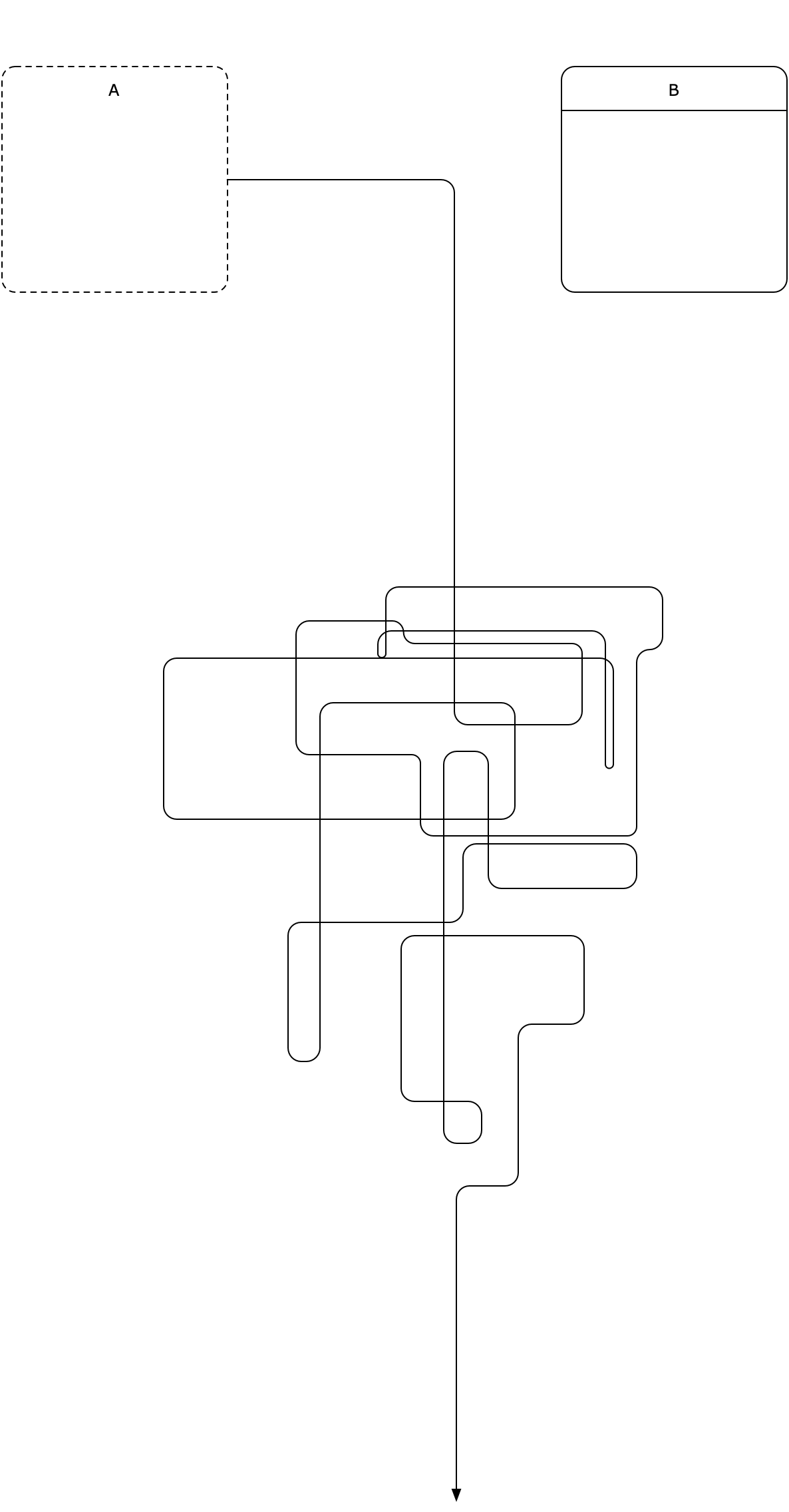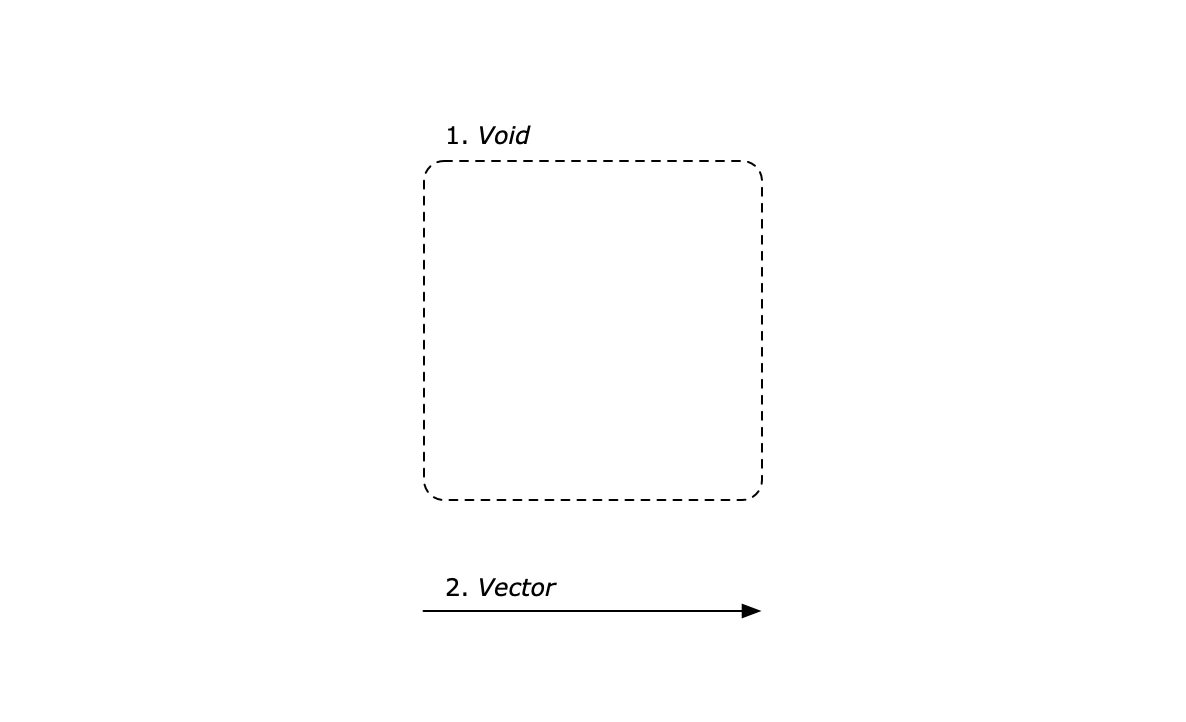
The job calls to us. An emptiness that wants to be filled, its incompleteness gapes, demands its resolution.
And so we set out a path toward completeness; set out to get the job done.
You are surely familiar with jobs. You yourself have completed many: you have taken out the trash, put away the clean silverware, tucked the children into bed. Chores are jobs. Perhaps you have such a job waiting for you right now. Maybe it is whispering to you, asking to be done.
A job calls for completion. Jobs are self-fulfilling prophesies, loops that demand of us their own closing. Taking care of our bodies is a job. Eating is a job, urinating and defecating are jobs, and resting is a job. Sex is actually a job too.
When a loop is open, we feel need; the loop closes when we are satisfied. Our bodies drive us toward the completion of jobs, the fulfillment of needs, the closing of loops, the iteration of patterns.
We cannot neglect our jobs for too long. Their demands become too great. If we do not eat for too long, we get hangry. If we are sexually deprived, there are plenty of things we can do to get the job done. And eventually, we have to pee somewhere. We can try to ignore them, but in the end, our jobs will find a way to get themselves done.
This is the most natural state of being human. Equilibrium is nonsense to us, and meditation is just a temporary hack; for us, there is always a job to be done. Even the enlightened eat, sleep, and rest. The most basic human jobs need frequent re-completion.
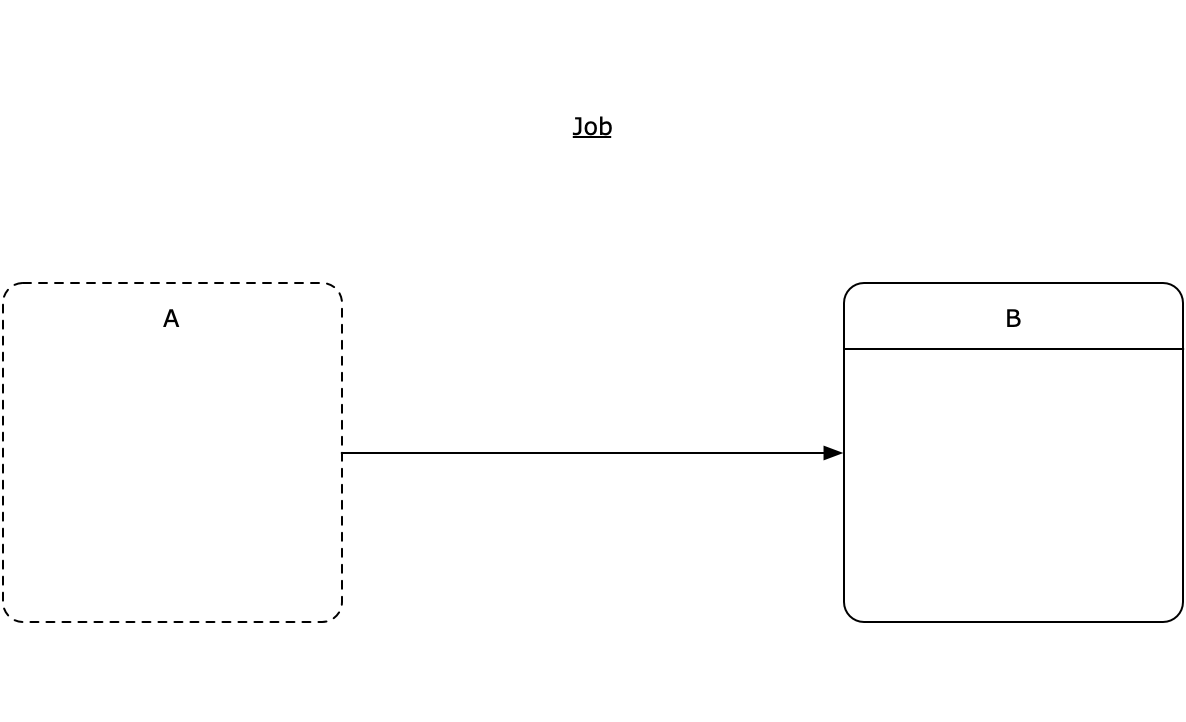
There is no single way to do a job. You can achieve the satiation of your appetite by many means. On one day you may dine on a delicious chanterelle risotto, and on the next you may eat cheese puffs until you are sick.
Similarly, there are many ways to accomplish relieving oneself. Discretion is an important part of this job. Although we typically opt for the most convenient nearby cafe with an available private restroom, in a pinch, peeing in the middle of the woods among secluded bushes, or in an even more desperate scenario, hidden behind some cars in an alley, will get the job done.
You might have heard of “Jobs To Be Done,” the innovation philosophy popular among consultants. There is some disagreement on exactly how to use the framework, but both versions want to understand why customers buy products. One approach asserts that people buy products in order to do work. It views a job as a high level thing to be accomplished, and proposes a taxonomy of smaller jobs. The other approach asserts that people buy products to make some progress in their lives, but mostly don’t want to work. This version views a job as a desire someone has—as an unfulfilled need-state.
What both camps acknowledge is the many ways there are to do jobs. The most famous Jobs To Be Done case study is that of a fast food franchise. The business hired some management consultants to figure out how to increase milkshake sales. The consultants looked at purchase data and found that some customers regularly bought milkshakes early in the morning. After interviewing the customers, they discovered that the milkshake drinkers were all long-distance commuters. They needed something that would keep them awake in the car as they drove over 45 minutes to work. A milkshake did this job very well, because a milkshake can be held with only one hand, slurped without mess, and lasts a whole car ride.
For any given job, there are ways that are better and those that are worse at getting it done. A piece of toast is crumbly and gets cold. When braking quickly, a plate of scrambled eggs would slide right into your lap. A milkshake is the perfect commuter’s breakfast. A protein bar might do this job well too. In this way, Jobs To Be Done says that people “hire products” to do jobs.
We are doing jobs all the time. Or, perhaps more accurately, we are getting jobs done for us constantly. These jobs range from the bodily and tangible, such as having a filling breakfast or getting some rest, to the abstract and immaterial, such as impressing a lover. We can get help with these jobs by “hiring products,” but often products aren’t necessary, and we “hire an approach” instead.
There are many ways to show a special person we care about them, and some ways might involve hiring a product. We can buy them a milkshake, or flowers, or Japanese breakfast. But we could also cook them a fancy dinner, or read to them in bed, or stay up late asking fun questions about their childhood. Often, we simply hire an approach.
Most jobs are abstract and immaterial, but even these are based in the body. When a job is waiting to be completed, we can feel its draw on us, emotionally and physically. A job to be done is a psychosomatic state. It is an unsatisfied need, waiting to be fulfilled, a loop waiting to be closed. The trash that “needs to be taken out” is a social reality, and a psychological reality, cued by smelly physics. Likewise with our romantic partners. Of course it is nice to let them know we care, but behind this desire to impress our lover is also a need of our own. Perhaps it is to feel liked in return, to be confident that we are good lovers, or to know that we are secure in a relationship. Maybe these are real jobs to be done, and impressing our partner is the approach that we have hired.
At any given time, we have many jobs to be done. Each job is a discrete need-state, like “un-taken-out trash” or “un-impressed date” or “un-spoiled snow that is practically begging me to trammel in it.” Jobs can be defined in this way, as incomplete states, or as voids. Like affordances, jobs emerge in the relationship between ourselves and our environment. They are voids that suggest what to do with them, voids that demand to be filled.
A relationship that has ended often leaves a job to be done. The idea that we need “closure” points to the void that has been left hanging open: blame or gratitude unexpressed, words unspoken, understanding unreached. Closure too can be achieved in multiple ways. Sometimes it requires a conversation. Other times, a long email sent to our counterpart, with no expectation of response, is sufficient. And simply reaching a new phase of growth on one’s own can clear the void.
Indebtedness is not primarily a material deficit, but an emotional one: it is a job to be done. Anthropologists who study gift-giving understand gifts to be a special sort of loan. Gifts between friends and families are often not repaid in kind, thereby revealing the loan, but through another vehicle. The repayment is always appropriate to the debtor’s relative affluence. A gift of a goat or cow may be repaid with a small feast, a medicine, a ceremony. Favors are similar. You may repay your neighbor for watching your children during your date night with a bottle of wine or a bounty of vegetables from your garden. As long as it is appropriate to the size of the void, the denominated currency of the repayment is not important. What is meaningful is that it gets the job done.
For some jobs, it doesn’t matter what approach we hire. When we just need some exercise, we can go on a run, go rock climbing, lift weights, or play an hour of competitive table tennis. The main job of lunch is just to have energy for the rest of the day. How many memorable lunches have you had in the last month? The approach is not so important. To express an idea, we can write an essay, hold a discussion group, build an app, or make a tweet. I have a list of twenty-nine idea receptacles. They are ways of getting a job done. For me, what’s essential is just to put an idea into an idea bucket and empty it, so my brain is free to think about other things. “Jobs to be done” is an unexpressed idea, a void, and this essay is filling it.
The approach seems to matter less when convenience and immediacy is a part of the job. “I prefer to brew my coffee, but Starbucks instant is so convenient I hardly ever do what I ‘prefer,’” says Tim Wu in his essay on convenience. “Convenience has the ability of making other options unthinkable.” When we are desperate, the quality of our coffee does not matter as much as its caffeine content. But the most convenient approach may not be the best approach, or even our preferred one. That is only what milkshake advertisers want you to think. If other factors like cost and dental health are part of how we think about the job, drinking a milkshake every morning starts to seem like a less appealing approach to hire.
For many other jobs we do, the approach is already an important aspect of the job itself. Some ideas are better expressed through an essay, rather than a culinary experience. A bar tab cannot be closed out by buying the bartender a round. The job “take out the trash” cannot truly be done by just pitching the bag out the window. We wouldn’t consider this job “completed.”
As we consider our jobs more deeply, the criteria for completion often change. Convenience becomes less important than our health. Instead of buying a milkshake, we wake up fifteen minutes earlier to make a fruit smoothie. Instead of seeking casual sex on dating apps, we look for a romantic partnership. The more we get to know ourselves, and the more deeply we consider each job to be done, the more able we become to choose our preferred approach.
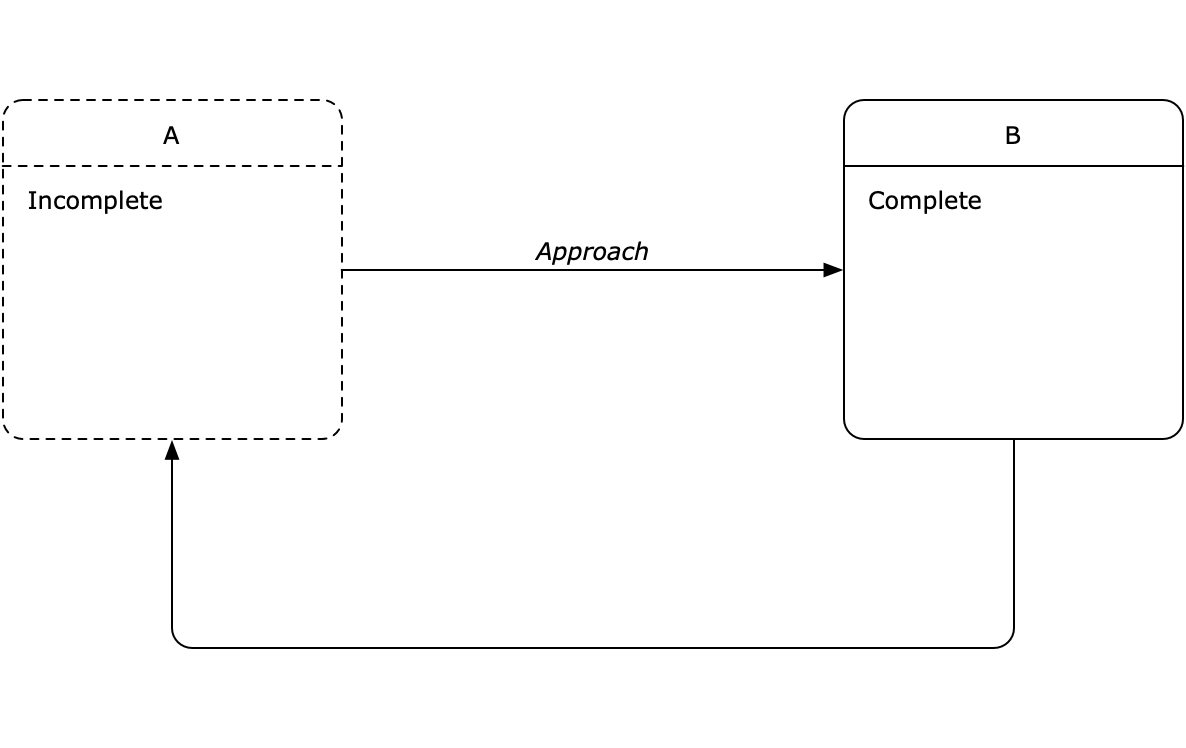
A job can be an instance of a pattern. Many need-states emerge from patterns we don’t even observe about ourselves. I had this thought on a Monday, in a car, driving north on Highway 101. On Monday mornings I dedicate 45 minutes to reflect and journal, a habit formed after a few years of Monday morning appointments with a psychologist. This particular Monday, I was busy checking out of a hotel, and momentarily regretted missing a chance to write down my thoughts and feelings. I forgot about it quickly—that is, until I was in the car, on Instagram, making a post with photos that best reflected my last few weeks, writing a long caption as a memorial. Without even trying, I found another way to get the job done.
An undone job is an emotional deficit. To get the job done is to use any method that can close the loop. If we feel a job is undone, we will try to get it done, even when we don’t think we are working on it. We will hire an approach unconsciously. Passive aggression is the result of a job getting done unthinkingly. We feel slighted; someone has incurred our anger. If we try to deny it, it is inevitable that the anger will get expressed, one way or another. It will slip out in a snide comment, a forgotten appointment, an automatic eye roll. It is difficult for us to resist the pull of our jobs to be done.
We are getting jobs done for us in this way all the time. But hope is not lost. If we become aware of our jobs to be done, we can easily choose which approach to hire—we can be direct, or we can express our frustration. If not, they will “get done” by some other method before we know it.
I don't believe in destiny, just locally-scoped teleological drives
— Toby (@tobyshorin) July 13, 2019
But never mind passive aggression; what about passive everything else? We are frequently in need of expressing affection, sadness, joy, care, courage, fear, attraction… The unexpressed parts of ourselves are permanent emotional deficits. We deny that they are there, but they still find ways of getting themselves done. If expressing courage is the job to be done, we become fearless drunks and tell someone we have a crush on them. Many boys learn only to use aggression to do the job of expressing affection. This is called “banter.” We get used to our typical methods of getting jobs done, and apply them to inappropriate jobs. The more we learn about ourselves, the easier it is to hire the best approach.
Have you ever fallen for someone, in love with their courage, their intelligence, their vulnerability, their power? Perhaps you have broken up with them, only to later discover this very trait in yourself. When we begin to value the things we believe we ourselves lack, we miraculously find partners that exhibit those characteristics. They do the job for us, but to completely resolve the need-state, we must close the loop ourselves. As Robert Bly says, we must retrieve and eat our shadow.
Our jobs call to us, consciously or not, asking for fulfillment. Some emotional deficits are so old and deep we can never fully close the loop out; we repeat these jobs, over and over, iterating through many approaches, but still we feel the void. We date the same type of person. In conversation, we try to make clever comments, to be seen as valuable. Is “expressing an idea” the ultimate job? Or is it an approach I have hired for something else? To feel smart ? To have status? Developing our awareness may never clear out the need-state, but we can get used to the void; we build a house next to it, and soon we grow comfortable with its presence. Only after we discover the jobs we have been trying to get done can we decide to retire from it.
Even when we experience existential doubt, we still do our jobs. We drink and rest, we generate revenue, we socialize, we go on dates. We follow our morning routine, we make coffee or buy a milkshake. Habits are jobs we have gotten used to completing in certain ways and orders, time and again until they become familiar to us, the fabric of our lives knit together by loops we close. Only great narrative loss derived from trauma disrupts this repetition of jobs. The foreshortening of the future disrupts even basic jobs, because it erodes predictability, the foundation of patterns. The very depressed often have trouble eating.
Our intentions don’t always align with our jobs. Even jobs that we did not choose compel us. Memes are other people’s patterns, loops that we begin to start closing ourselves. We feel when a television show is unfinished, as well as its individual episodes, leading to binging. “Oddly satisfying” videos of industrial machining processes create arbitrary voids and fill them repetitively, opening and closing loops one after another. We are closure junkies. Video games assign us arbitrary jobs and prominently celebrate their moment of completion. The most addictive video games open loops forever, each iteration different yet each fundamentally the same. These games have no end, which is why over time they come to feel like work.
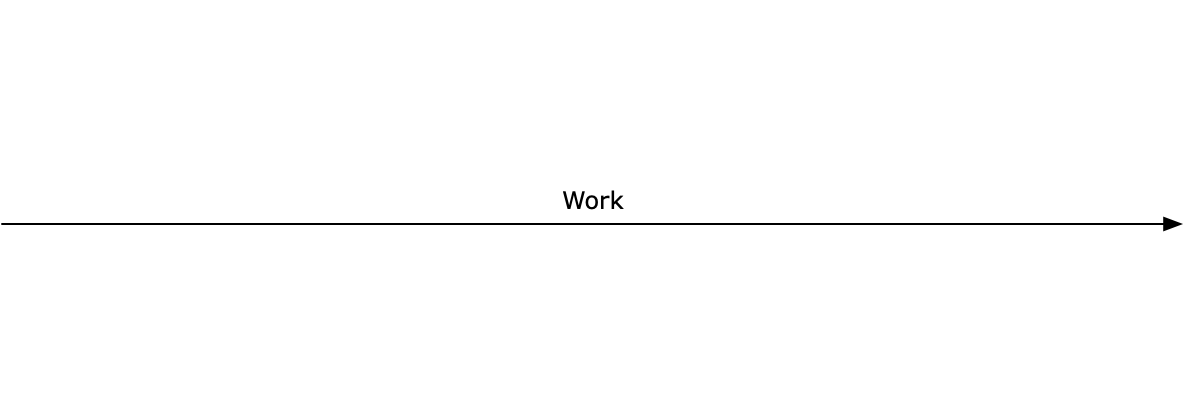
Although work involves many jobs, work is never done. This is how we know work is a different type of thing than a job: no matter how many jobs we complete, work is never finished. Unless we decide it is—and even then, it is merely abandoned, retired from, or concluded too early. “Tragically, he died young, after releasing only 3 albums.” The tragedy derives from the fact that there is always more work to do.
Jobs, on the other hand, are over when they are finished. Having a completion state is what makes a job a job. Some jobs, of course, are work-related. Small jobs, like sending invoices and designing websites, are composed into bigger jobs, like freelance projects.
We go to work to do our jobs. Jobs are work, but work is not a job. We do jobs at work. Work is a location to which we go to do a job. Work is not only a physical location, like an office or a cafe. It is also a location in time: 9-to-5, or 9/9/7, or the length of a phone call. Work is someplace we inhabit for a continuous duration, a distinct psychological state. Work is continuous time, an endless temporal zone, but jobs are discrete, the repetition of patterns that increment time forward.
Certainly we can leave work, but we can always come back. Even when we retire, going back to work is always an option. That is because while work is not a job, working is a job to be done.
Not all jobs come from within ourselves. Physical addictions create jobs from the use of addictive substances. A norm is a job that we learn from our social context. Once we are used to them, we compliantly do these jobs, often without thinking. But we strongly feel when they are deviated from.
Other people give us jobs for their own reasons. Advertisers create voids and position their product as the best way to fill it. “Jobs To Be Done” was invented by marketing consultants whose role was to sell things. Marketing is a kind of job creation program. Because it is so profitable to convince consumers to do jobs, entire economies are built on these programs. Living where there is a high concentration of advertising, in big cities like New York, can be stressful, because the environment tries to assign us jobs just about everywhere. Although we think we can tell the difference between one of our own jobs and a job that is incepted in our brain by advertisers, over time, it can become difficult to tell.
Worse, jobs can come from people who do not have our best interest in mind. Some people are excellent at creating need-states we have never felt before. Slowly, these jobs encroach, becoming more and more demanding, needing completion over and over again. A skillful manipulator will make the jobs they assign us seem more important than the jobs we were doing before.
Most narcissists are deeply hurt. They themselves have jobs to be done, repeatedly and with intensity, frighteningly dark voids they must constantly fill with attention, affection, and control. That they view us instrumentally, perhaps not unlike a product they are hiring, is not our fault. So we can have some empathy for the narcissist.
But it hurts us not to do our own jobs, because the neglect of our own emotional deficits is painful and difficult. When something or someone is preventing us from doing the jobs that are most central to who we are, we must reevaluate.
Understanding where jobs come from is equally important as finding the right way to get them done. We can know the difference between one of our own jobs and a job created by norms, advertisers, and other people. To do that, we must look outside the scope of the job itself, and discover what creates the void.
Our most significant jobs define who we are. Communing with others is one such job that is core to being human. Just as a bee’s job of pollination is central to what a bee is, humans have jobs of socializing. For many hundreds of thousands of years, this job of communion was easily accomplished by our forms of social organization. Throughout our lives, we were accompanied by significant others: by our kin, and by the gods. Today, however, we are very lonely. We are not sure we are socializing correctly. We are born alone, we are told, and must find our people.
There are many people who today think we can “hire a product” to fill the god-shaped void in our lives. There are many entrepreneurs who believe that “community” can be packaged and sold, or replaced with a platform, a product ready-made for us to hire.
There really are many ways to get this job done. Some products might even work. But no matter how deeply we look inside ourselves, the reasons for this new persistent need-state, for this “epidemic of loneliness,” are not personal. We should not mistake a systemic problem for a mere job to be done.
There are old jobs too, jobs that go back hundreds of generations, which today are simply not getting done. This is no fault of our own. We have grown so used to their lack of fulfillment that we have forgotten they exist altogether. In the United States, having loving community is such a job. For most of the population, the job of satiating our appetite has become detached from the job of working with the land. For city-dwellers, feeling connected to the natural environment is a job that is rarely completed. And some believe that connection with our ancestors is a job that the secular West has forgotten about completely.
In other cases, the forgetting of jobs is motivated. There are entire movements dedicated to the refusal of certain jobs. Some movements insist on voluntary celibacy, others avoid knowledge acquisition, and still more inculcate suspicion and deny trusting others. These ideologies are successful in part because it takes many people working together to deny the reality of deeply-felt needs like sex, curiosity, and togetherness. One person alone cannot deny their importance. An individual will only be left feeling deficient.
When a forgotten job gets completed, it is often unintentional. To accidentally complete such a job produces a sense of surprise, wonder, and even familiarity, as if we have discovered a part of ourselves we did not know was there.
Our jobs are with us all the time. To be alive is to have jobs, to complete drives, to increment time forward. We unfailingly get our jobs done by some means or another, and only by becoming conscious of them can we choose how.
A void: an emptiness, a deficiency. A vector: a trajectory, a conclusion. Some voids do not stay filled, and these are called jobs.
Voids are empty, but they can be heavy. We feel the presence of the ones that have been with us the longest. Invisible yet imposing, they call to us, and we fall in time and again.
But a void is also nothing, and nothing is very lightweight. Once we learn to see voids, we can dance around their edges, we can walk on air.
